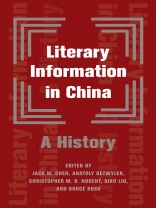“Information” has become a core concept across the disciplines, yet it is still often seen as a unique feature of the Western world that became central only in the digital age. In this book, leading experts turn to China’s textual tradition to show the significance of information for reconceptualizing the work of literary history, from its beginnings to the present moment.
Contributors trace the organization of literary information across China’s three millennia of history, examining the forms and practices of information management that have evolved alongside the increasing scale and complexity of textual production. They reimagine literary history as information processing, detailing the many kinds of storage, encoding, sorting, and transmission that constitute and feed back into China’s long and ever-growing cultural tradition. The volume features state-of-the-field essays on all major forms of literary information management, from graphs to internet literature, and from commentaries to literary museums and archives. By shifting focus from individual works and their authors to the informatic schemata of literature, it identifies three scales of information management—the word, the document, and the collection—and surveys the forms that operate at each level, such as the dictionary, the anthology, and the library.
Literary Information in China is a groundbreaking work that provides a systematic and innovative reassessment of literary history with implications that extend beyond the particular Chinese context, revealing how informatic practices shape literary tradition.
İçerik tablosu
A Note to Readers
Chronology
Foreword by Ann M. Blair
Introduction by Jack W. Chen, Anatoly Detwyler, Xiao Liu, Christopher M. B. Nugent, and Bruce Rusk
Part I: Information Management at the Level of the Word
Section A: Graphs, edited by Christopher M. B. Nugent
1. Graphs, by Zev Handel
2. Script Reform and Alphabetization, by Yurou Zhong
3. Indexing Systems, by Uluğ Kuzuoğlu
4. Character Input, by Thomas S. Mullaney
Section B: Lexicons, edited by Bruce Rusk
5. Early Lexicons, by Zev Handel
6. Rime Tables, by David Prager Branner
7. Later Imperial Lexicons, by Nathan Vedal
8. Early Twentieth-Century Dictionaries, by Yue Meng and Xi Chen
9. Post-1949 Dictionaries, by Jennifer Altehenger
10. App-Based and Online Dictionaries, by Michael Love
Section C: Text and Textual Divisions, edited by Jack W. Chen
11. Sentences, Paragraphs, and Sections, by Dirk Meyer and Lisa Indraccolo
12. Lines, Couplets, and Stanzas, by Jack W. Chen
13. Premodern Punctuation and Layout, by Imre Galambos
14. Modern Punctuation and Layout, by John Christopher Hamm
Section D: Commentaries, edited by Bruce Rusk
15. Early to Middle Period Classical Commentaries, by Michael Nylan and Bruce Rusk
16. Poetry Commentaries, by Michael A. Fuller
17. Fiction Commentaries, by Martin W. Huang
18. Drama Commentaries, by Yuming He
19. Reader’s Guides, by Maria Franca Sibau
Part II: Information Management at the Level of the Document
Section A: Anthologies, edited by Jack W. Chen
20. Early Anthologies, by Michael Hunter
21. Medieval Literary Anthologies, by Xiaofei Tian
22. Later Imperial Poetry Anthologies, by Gregory Patterson
23. Later Imperial Prose Anthologies, by Timothy Clifford
24. Religious Literary Anthologies, by Natasha Heller
25. Premodern Fiction and Fiction Collections, by Ling Hon Lam
26. Premodern Drama Anthologies, by Ariel Fox
27. Modern Literary Anthologies, by Charles A. Laughlin
28. Modern Drama Scripts Anthologies, by Tarryn Li-Min Chun
29. Textbook Anthologies, by Michael Gibbs Hill
Section B: Encyclopedias, edited by Christopher M. B. Nugent
30. Medieval Encyclopedias, by Christopher M. B. Nugent
31. Middle Period Imperial Encyclopedias, by Sarah M. Allen
32. Later Imperial Vernacular Encyclopedias, by Cynthia Brokaw
33. Qing Dynasty Imperial Encyclopedias, by Stefano Gandolfo
34. Twentieth-Century Vernacular Encyclopedias, by Joan Judge
35. Online Encyclopedias and Wikis, by Shaohua Guo
Section C: Histories, edited by Anatoly Detwyler
36. Early Histories, by Griet Vankeerberghen
37. Early Medieval Histories, by Zeb Raft
38. Dynastic Histories from Tang to Song, by Anna M. Shields
39. Late Imperial Histories, by Devin Fitzgerald
40. Literary Histories, by Theodore D. Huters
Part III: Information Management at the Level of the Collection
Section A: Libraries, Museums, and Archives, edited by Xiao Liu
41. Libraries from the Early Period to the Tang, by Michael Nylan
42. Libraries from Song to Qing, by Ronald C. Egan
43. Late Imperial Literary Archives, by Kaijun Chen
44. Modern Libraries, by Jidong Yang
45. Modern Literature Museums and Archives, by Kirk A. Denton
46. Document Services, by Xiao Liu
47. Thematic Research Collections, by Donald Sturgeon
Section B: Bibliographies and Indices, edited by Bruce Rusk and Xiao Liu
48. Early Bibliographies, by Michael Nylan
49. Medieval Bibliographies, by Evan Nicoll-Johnson
50. Later Imperial Bibliographies, by Stefano Gandolfo
51. Twentieth-Century Bibliographies, by Anatoly Detwyler
52. Indices and Concordances, by Donald Sturgeon
Section C: Serial Publications, edited by Anatoly Detwyler and Xiao Liu
53. Premodern Literary Collectanea, by Suyoung Son
54. Modern Literary Collectanea, by Robert J. Culp
55. Literary Newspapers and Tabloids, by Alexander Des Forges
56. Literary Journals, by Jianli Li
57. Overseas Chinese Newspapers, by Carlos Rojas
58. Internet Literature, by Jin Feng
Bibliography
Contributors
Index of People and Select Institutions
Index of Documents, Publications, and Electronic Resources
Yazar hakkında
Jack W. Chen is associate professor of Chinese literature at the University of Virginia.Anatoly Detwyler is assistant professor of modern Chinese literature at the University of Wisconsin-Madison.Christopher M. B. Nugent is professor of Chinese at Williams College.Xiao Liu is assistant professor of East Asian studies at Mc Gill University.Bruce Rusk is associate professor of Asian studies at the University of British Columbia.












